'The Fraternity Nobody Wants to Be Part Of:' Marty McNair, Mike Locksley's Unique Bond
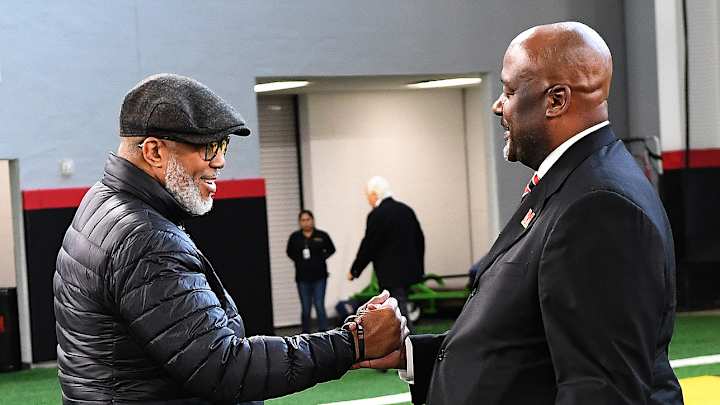
COLLEGE PARK, Md. — On a Sunday in May, Marty McNair arrived at Mike Locksley’s home for a large, expansive post-funeral gathering to celebrate the life of Venita Locksley, Mike’s mother, a victim of cancer. What he walked into was an intimate affair, not large at all, of mostly close relatives, a family-only function that, given his invitation, left him finally understanding the full breadth of his bond with Maryland’s new head football coach. “I really saw the magnitude of the relationship,” McNair says. “I was kind of like, ‘O.K., we really are cool.’”
Cool, in this case, carries with it a deeper meaning, because there is no good word to describe what has unfolded here—two fathers, Mike and Marty, uniting over the tragic deaths of their sons, Meiko and Jordan. The evidence of this newfound friendship is exactly one year old this week. The anniversary of Jordan McNair’s death from heatstroke suffered at a Terrapins football workout is Thursday, and the day after is when Marty received his first phone call from Mike, then an Alabama assistant coach and a man who had recruited his son years before. The calls kept coming, each morning for at least a week, Mike guiding Marty through a grieving process he knew so well, his own son Meiko having been shot and killed in 2017. He warned him about the numbness he felt during his son’s funeral—an out-of-body experience, he told Marty—and he prepared him for the hardest part of it all: when his son’s face disappeared beneath the casket door. You’ll think you got it together, Mike told Marty, but you better stand close to somebody when that casket closes. He told him about the breakdown that happens later, maybe the next day or even the next week, when the finality of it all crushes a man “like a bag of bricks,” Mike says. He told him about the anniversaries—oh God, the anniversaries. The birthdays, the holidays, Mother’s Day and Father’s Day, they are the worst. “People didn’t know,” Marty says during a recent interview with Sports Illustrated, “but Locks was the one calling me every day when Jordan passed. I’m getting goose bumps talking about it.”
Since then, a lot of has transpired—most notably Mike being hired as Maryland’s head football coach—and that has only strengthened a friendship between these heartbroken fathers. They’ve become cigar-smoking buddies. They were together as recently as this past Sunday, and last Monday, Marty even spent time in the Maryland football offices waiting for his good friend to complete work before a dinner date. “It’s bigger than Maryland, bigger than anything you could imagine,” says Carlton Carrington, Marty’s business partner in Baltimore and the person who introduced the two men back in 2012.
This bond is so unique because it involves the new leader of an entity, Maryland football, that is responsible for the death of his buddy’s son. Mike was 800 miles away when, on Day 1 of Maryland’s summer workout program last May, Jordan collapsed during sprints, when his core temperature rose to 106 degrees, when his jaw clenched shut and his body convulsed. Mike’s removal from the situation does not change the fact that these two men will soon be on opposite sides of a legal fight.
“One of the interesting things here is that Marty is so happy for Locks, so happy the program is in the hands of someone else and would rather not have to sue the program or the university knowing the collateral damage that might cause,” says Hassan Murphy, a managing partner for a Baltimore-based law firm representing Jordan’s parents. “Marty doesn’t want to have to act for justice in a way that hurts his friend, but he will. Here we are, just about on the anniversary of Jordan’s death, and we still have no closure. Thus far, we have not been presented with anything that approaches the kind of justice this situation demands. It is looking like, unfortunately, a lawsuit will be filed sometime in the near term.”
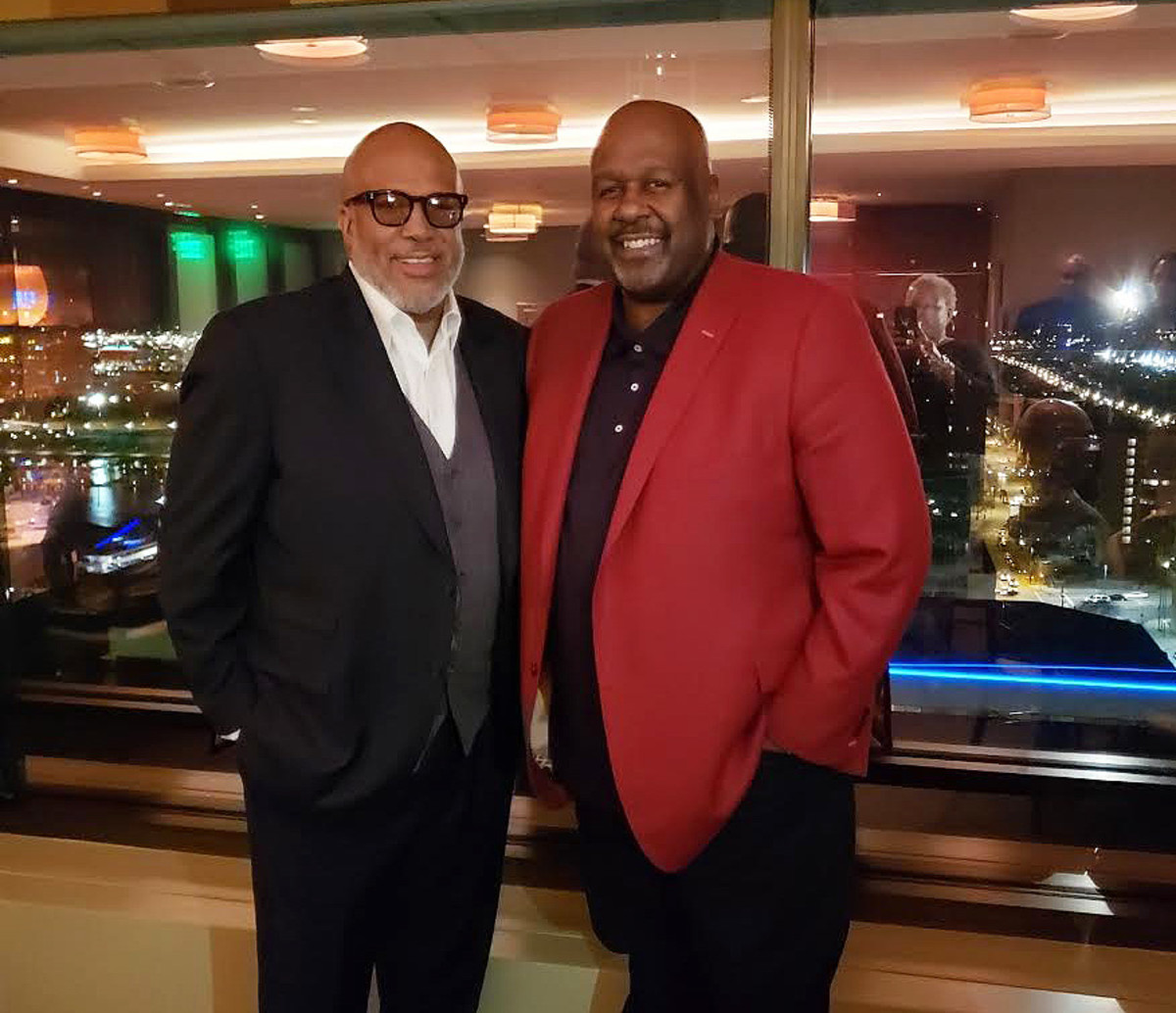
In the dark last Thursday, Marty McNair stirred from sleep. He walked from his bedroom to his home office, its walls blanketed with photographs of his son Jordan. Here, Marty says, his spirit is the strongest. He slept on his office couch the rest of the night. A week later, he now asks himself a question that he cannot answer: Why did I do that? He believes it involved the date. Last Thursday, June 6, marked the halfway point of his 19-year-old son’s 16-day hospital fight against death, one that included a liver transplant and a transportation to a shock trauma wing. “I spent that night in the hospital and I was in the chair behind all the stuff he was plugged up to,” Marty says. “Last Thursday was something about that.”
Mike Locksley has these moments, too, mostly during his early-morning drives to the office. Mike and Meiko had an almost standing appointment each morning at 7:30 for a quick phone call. “There’s times where I find myself almost calling him,” Mike says, “and I’m like, [expletive], he’s not here. I still got text messages saved on my phone that he sent.” The lock screen on Mike’s iPhone is a photo of Meiko. The screen saver on Marty’s laptop is a picture of Jordan. These two men share so much. This is a relationship steeped in tragedy, sculpted through tears and forged from heartache. “It’s the fraternity that nobody wants to be a part of,” Marty says. “You’re damn near connected like kindred spirits.” Mike calls it an organic relationship. “Nothing is worse than (people saying), ‘Hey man, I know what you’re going through,’” Locksley says. “No, you [expletive] don’t.”
Tattooed in both of their minds is the last conversation with their sons, each by phone. Mike spoke to Meiko in the bowels of the Mercedes-Benz Stadium in Atlanta on the night of Sept. 2, 2017, hours after his Alabama offense outscored Florida State 24-7 in a season-opening victory. About 24 hours later, Meiko, age 25, was gunned down in Columbia, Md., a southwest suburb of Baltimore. Marty spoke to Jordan on May 28, 2018, Memorial Day. The topic? His new haircut. “That Monday, somebody had messed his hair up. He had one of those wild haircuts. All his hair was cut off,” Marty smiles recalling the story. “It was a normal conversation. ‘Hey, have a good week. I know practice starts tomorrow. Call me later.’ That was pretty much the last conversation that we had. Then we got the call that Tuesday night. They were basically saying Jordan had a seizure. It was like ‘What the hell?’”
For Marty, those 16 days of hospitalization still hurt. He was optimistic for the first 15. Early on, despite being intubated, Jordan even squeezed his hand. At one point, doctors told Marty and Tonya Wilson, Jordan’s mother, that their son would never again play football, but that was O.K., Marty thought. He's going to live. Under advice of counsel, Marty declines to reveal any more details of the hospitalization, aside from a persistent thought that occurred to him while watching his son on that hospital bed: "If I could have traded places, I would have been like, ‘[expletive], take me. Let him live longer.’"
The cases of Meiko and Jordan, while vastly different, leave the same feeling of confusion at their end. There are so many questions and so few answers. Why wasn’t Jordan immediately submerged in a cold tub at Maryland’s football facility and why wasn’t the ambulance called sooner? What was Meiko doing in such a seedy area and who would have wanted to shoot him? To the latter questions, the Howard County Police Department has searched for answers for nearly two years. Meiko was shot once in the chest near a sidewalk along Harpers Farm Road, a portion of Columbia that Howard County officials targeted years ago as a crime hot spot. The murder weapon has not been obtained, and there are no eye witnesses, but police believe people in the community have details on the murder. They are refusing to come forward. Police have knocked on doors, have posted public videos, have used confidential informants and have even increased the reward for information, from $5,000 to $10,000. The Locksley family is offering a reward as well, police say. “We need to get closure for this family,” Zirk says in an interview earlier this week.
Kia Locksley already has that. Her and her husband approach the investigation very differently. Mike still communicates two to three times a month with detectives, invested in the hunt for his son’s killer. “I can’t worry about who did what and catching whoever,” Kia says. “I’m a firm believer if that person who killed him doesn’t get justice for his death, it’ll come in another form.”
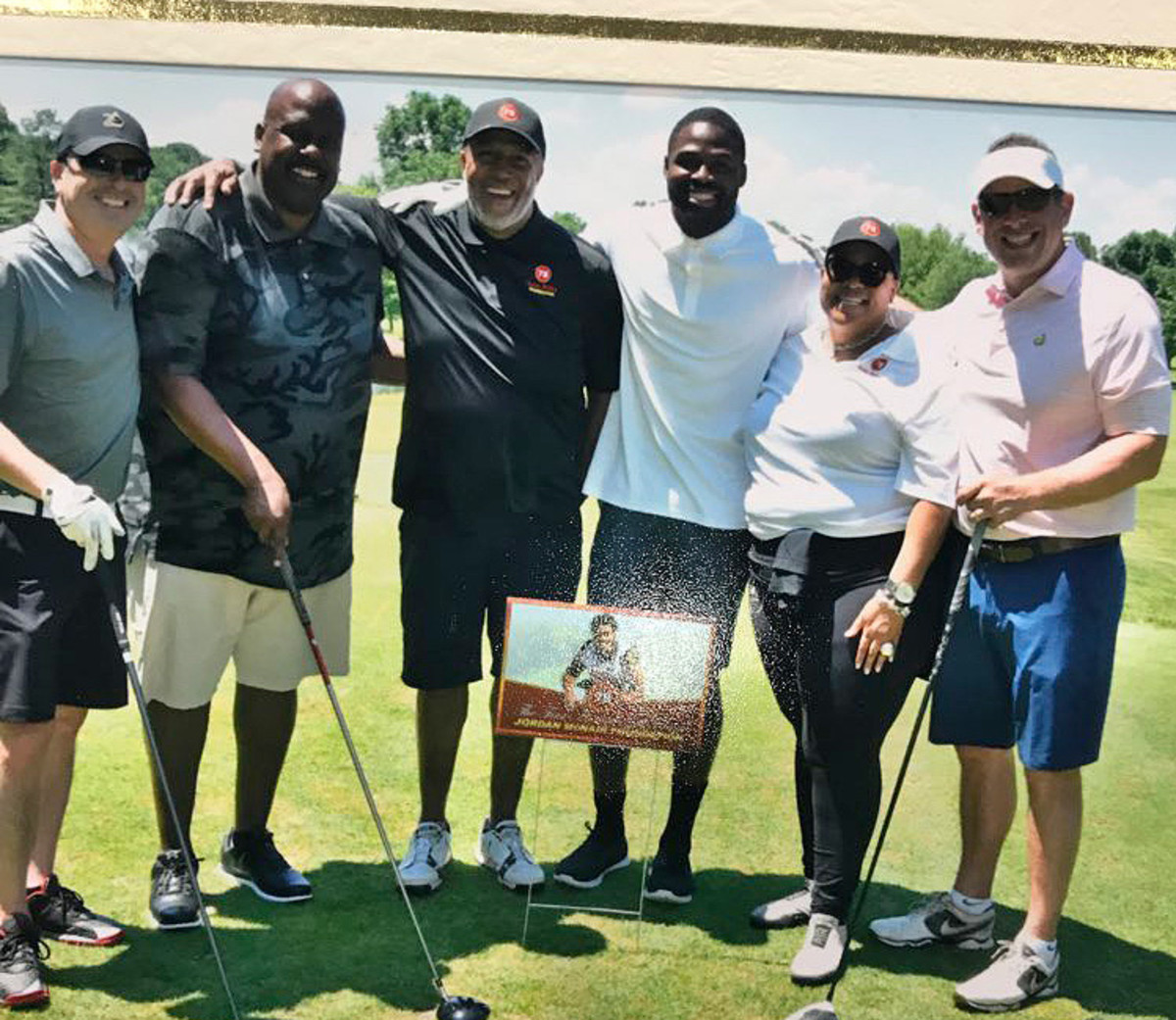
Long before they bonded over tragedy, Marty McNair and Mike Locksley were fathers of children in the same graduating class at McDonogh School, a prestigious private school in the Baltimore area. Kory Locksley, Mike and Kia’s only daughter, transferred to the school as a junior and, wouldn’t you know it, she landed in a few classes with a kid named Jordan McNair. During English and College Algebra, they’d sometimes partner together. Kory was a new student, and Jordan was a quiet but comforting figure. He also was a 6-foot-5, 300-pound offensive tackle ranked in the top-30 at his position nationally in the 2017 class.
The relationship between Marty and Mike became that of recruit and recruiter. They soon realized their similarities, two inner city boys from mid-Atlantic metropolitans (Mike from DC and Marty from Baltimore) with a passion for cigars. “They hit it off right away,” says Carrington, a longtime AAU coach in Baltimore known to most by his nickname, Bub. “They might go out and smoke cigars and I’d hear about it a month later. ‘What the [expletive]?! Y’all didn’t tell me!’” As an assistant at Maryland from 2012–15, Locksley recruited Jordan (and his father, of course) relentlessly, recalls Dom Damico, Jordan’s high school coach at McDonogh. Maryland head coach Randy Edsall put Locksley in charge of all of the most highly touted prospects in Maryland. That included Jordan. “Walt Bell was the coach on the staff who had my school,” Damico says, “but Locks really handled the four and five stars in the state. He worked behind the scene.”
Even after Edsall’s staff was fired during Jordan’s junior year of high school, Locksley kept recruiting him while serving as an offensive analyst at Alabama, before his promotion to position coach and then coordinator. There was even a time in the spring of 2016 when Saban visited the Baltimore area on a recruiting trip and Carrington remembers getting a call from Locksley. “He wanted (Jordan) to come to camp,” he says. “Saban was up here one week and Locks was like, ‘Get him down here so we can seal the deal!’” It never happened. Jordan committed to the Terps not long after Saban’s visit, in April of 2016. Maryland’s new staff sold Jordan on playing for his state school, Carrington says. “He drank the juice and stayed home to the detriment of his life,” Carrington says. “He should have never went there under those guys. Tragedy came out of it.” Those guys are gone now, of course. Circumstances of Jordan’s death swept in a new strength coach, a new group of on-field assistants, a new team trainer and, of course, a new head coach. Locksley’s first call before accepting the job went to Marty McNair. His next call went to Tonya Wilson. He asked and received their blessing. He asked one other thing. “‘What do you want me to do down here?’” Marty recalls Locksley asking him. “First thing I told him to do was get a team doctor and a team psychiatrist.”
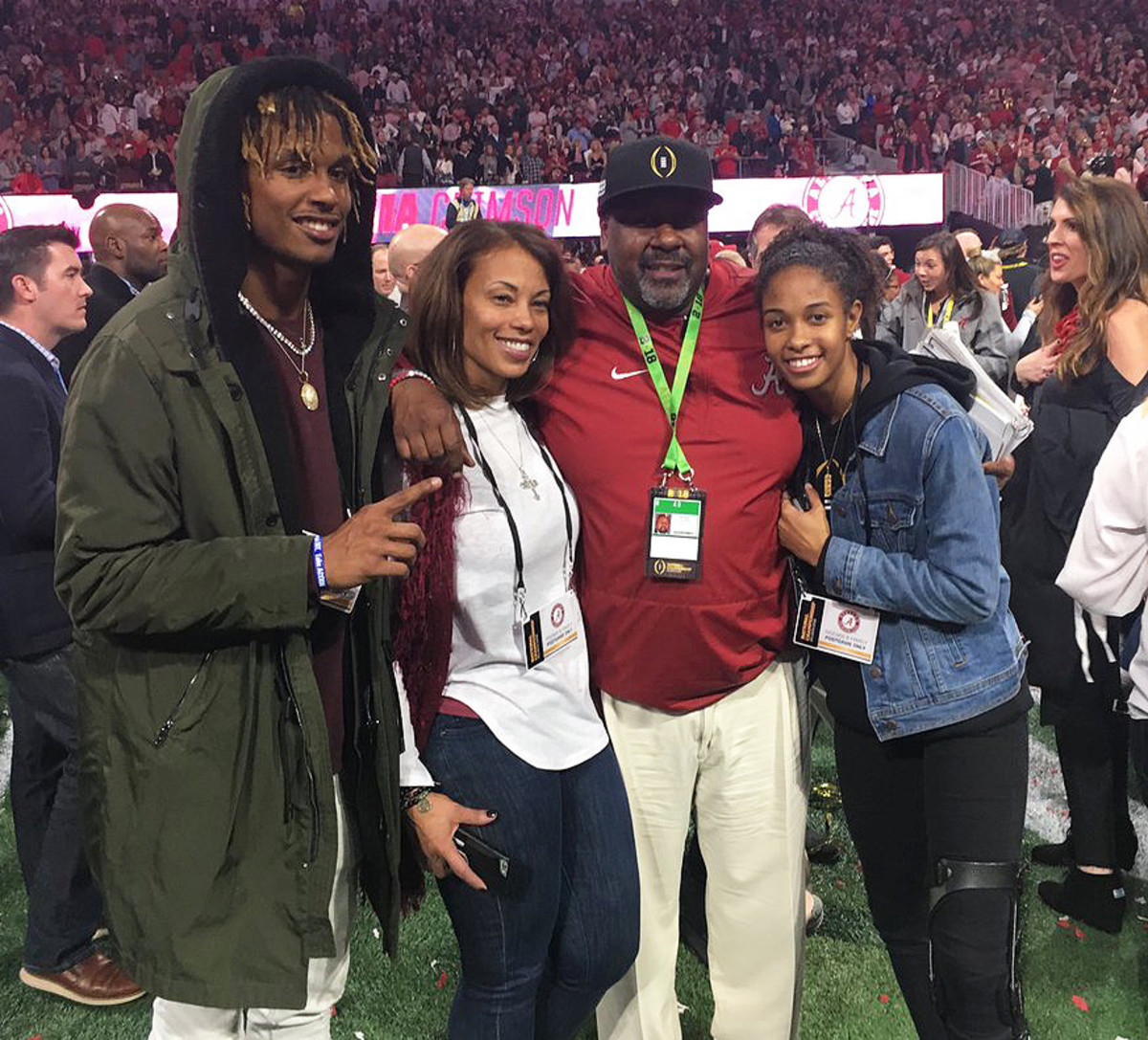
On May 12, Tonya Wilson received a call on her phone. She got a few calls that day—after all, it was Mother’s Day, the first one without her Jordan—but one call was more surprising than the others. It was from Mike Locksley. “[My wife] struggles on Mother’s Day,” Locksley says.
For Kia Locksley, it is the worst of all the holidays, even tougher than the anniversary of her son’s death or his birthday. Her and Mike have two other children: their youngest, daughter Kory, and the middle child, son Kai. Meiko was her oldest, born in 1992 quite literally across the street from Towson University, where as a freshman girl on her first day on campus Kia met a football-playing junior named Mike. A year later as a sophomore, she birthed Meiko at St. Joseph Hospital, and four months after that, Mike and Kia wed. Meiko was an athlete just like his younger siblings (Kory is a soccer player at Auburn and Kai is a quarterback at UTEP). He was quarterback and linebacker in high school and played defensive back during a journeyman college career, first at Youngstown State, then a junior college and lastly Towson. Around the first anniversary of her son’s death last fall, Kia began a yoga program at a juvenile detention center in Tuscaloosa, Ala., with help from Terry Saban, Nick Saban’s wife. Just imagine it: There she was instructing disorderly teens how to stretch their groins, balance on their heels and perform a proper situp. On the anniversary of Meiko’s death, it was better than the alternative. “I did tell Marty about that (anniversary) day,” Kia says. “Instead of pulling the covers over my head and crying, I tried to think about what the best way would be to honor our son. That to me was being at service. Our son was always helping people.”
Marty and Tonya raised Jordan while separated, “co-parenting,” Marty calls it. Tonya’s family embraces Marty as a member of theirs, Carrington says. It was a harmonious situation. Marty would pick up Jordan from Tonya’s home nearly every Saturday. They’d get their haircut or watch a movie. In fact, Marty and Tonya are still close, communicating in some way nearly every day. For Mother's Day, Marty got Tonya a card and gift addressed from Jordan to mom. While raising Jordan as split parents, the two of them still dated others. That ended for both of them last weekend. Marty proposed to his girlfriend Dawn on Friday. A day later, in a peculiar coincidence that neither was aware of until later, Tonya agreed to a proposal from her longtime boyfriend. “It’s been an interesting week,” Marty admits. “It’s a bittersweet week.”
Preparing for the first anniversary of your child’s death is not easy. Marty plans to spend it like he has much of the last year: working to bring awareness to heat-related illness through the Jordan McNair Foundation. He’ll be leading the first Jordan McNair Health and Wellness Sports Clinic on Thursday at McDonogh School. Maryland football coaches and players are expected to attend as well. The foundation is important to Marty. It has become his life, to the point where Mike says, “It’s almost as if Jordan died a martyr.” Locksley hopes to one day start a similar foundation in Meiko’s honor to bring awareness to mental health. Meiko suffered from schizoaffective disorder, a condition characterized primarily by symptoms of schizophrenia, such as hallucinations, and symptoms of mood disorder. Mike isn’t sure how or if it contributed to Meiko’s death. “I know this,” Mike says, “because of the mental health issues he’d go through… If you didn’t know he had mental health issues, and you became aggressive toward him, then a switch would flip.”
For Marty, among his missions with the Jordan McNair Foundation is to one day supply every Baltimore-area youth league with cold tubs, and he’s awarding the first wave of them on June 13 at the event at McDonogh. “Trying to turn this negative into a positive,” Marty says. “I got to look at it as a glass half full. Maybe it saves some lives. None of this [expletive] is easy.” Other anniversary plans includde the Maryland football team planting a tree on campus in Jordan’s honor. While half of the team visits McDonogh School, the other half will attend a youth field day at J.C. Nalle Elementary School in Washington D.C. Locksley will at least attend the event at McDonogh. More adversity sprang up for the first-year Terps coach over the weekend. While Marty and Tonya got hitched, Kai Locksley got arrested near El Paso, Texas, and booked on four charges, including driving while intoxicated and unlawful possession of a weapon. In no real surprise, Mike’s old friend was there for him Sunday. “It’s not a football type relationship. It’s not a ‘what’s going on with the team?” Marty describes their talks. “We talk about so much [expletive]. Once the cigar smoke goes in the air… you never know.”
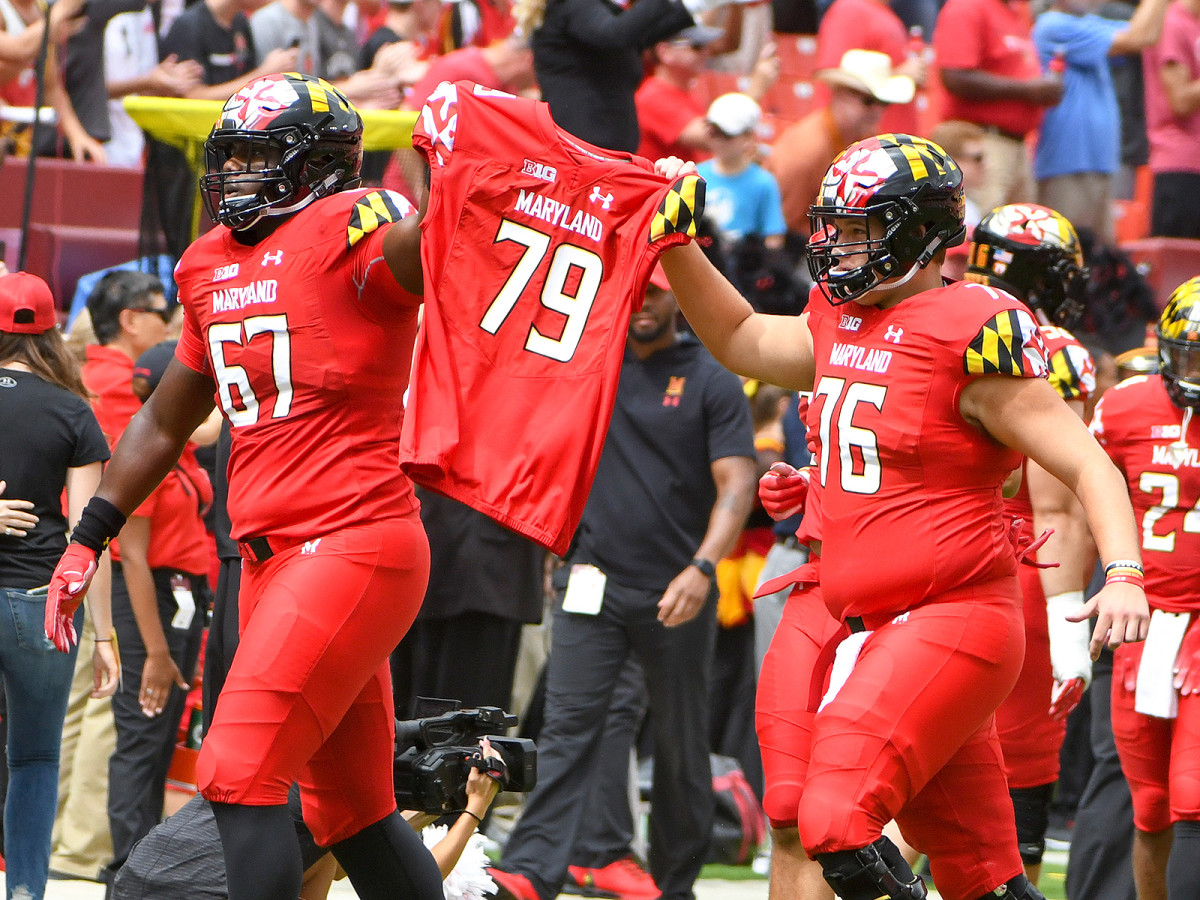
As the anniversary of Jordan’s death arrives, the only loose end seems to be the biggest—closure for his family. Attorneys believe the school and state have spent at least $8 million on the McNair situation. That includes three investigations and severance packages to fired coaches (ex-head coach DJ Durkin alone received or will receive about $5.5 million in a contractual buyout). Maryland and outgoing president Wallace Loh have publicly accepted responsibility for the death. So, what are Marty McNair and Tonya Wilson owed for the loss of a child if the football coach who oversaw the program got nearly $6 million? It might not be up to the university to decide. The attorney general’s office is representing Maryland and the university system on all legal claims related to Jordan’s death.
“We’ve been hoping that the university and state would do the right thing,” says Murphy, representing the family for the Baltimore-based firm Murphy, Falcon and Murphy. “We’ve waited all along, waited for the multiple investigations to resolve, waited for the reports, waited for the attorney general to finish his investigation based on the reports and on and on and on, so that everyone was in a position where they felt comfortable where they knew all of the facts. What that’s meant for Tonya and Marty is they’ve had to wait and have not gotten the finality and closure that I think they deserve.”
Settlement discussions appear at a stalemate, and a wrongful death lawsuit feels imminent. A multi-million dollar suit will keep a dark cloud hovering over a program that Mike Locksley is working to advance past what was a traumatic 2018. Ramifications could be great. “Locks and I have discussed that,” Marty says. “This is bigger than our relationship. He supports, you know, whatever we have to do. We both understand that. We’ve had this come to Jesus talk between us. That’s kind of brought us closer together.”
As for the current state of the football program, Barry Gossett believes the Terrapins are on the way up—lawsuit or not. Gossett, a longtime booster and member of the Maryland Board of Regents, has been around the school for decades. He attended his first Maryland football game in 1951 as a game-day usher with the boy scouts. Just last year he donated more than $20 million for an academic center, and in 2007 he gave $10 million for a football field house that bears his name. The Maryland football program, he says, is emerging from the ashes of a dreadful situation behind an adored leader who must navigate life as the little guy in a division with Ohio State, Michigan and Penn State.
“We were in a valley and we’re beginning to look at the top of the mountain and see how to get there,” Gossett says. “It’s not a direct path, but we’re beginning to climb the mountain, and I think that because of the new spirit that Mike brings.” From a cosmetic perspective, Maryland football is getting a makeover, in the form of a state-of-the-art, $155 million facility combining football with medical research and business development, a place that, from a symbolic view, “will move us away of any vestiges of old,” Gossett says. “It’s kind of the fresh start, not that you wipe the slate clean. You learn from mistakes.”
The lessons are hard, and this week’s anniversary is sure to bring sadness to this place and the surrounding areas. Damico, Jordan’s high school coach, even admits that football practices this time of year are not the same. “I see those big linemen running around and…” he says, “you just never know.” In a way, that is a positive. Awareness here for heat-related illness has never been greater. Jordan’s death created that sensitivity, just like it produced a relationship between two dads, each in their own way chasing closure for their son’s death. As this anniversary week winds down, maybe on Saturday night or Sunday afternoon, Mike and Marty may sit across from one another on a patio, pass the other a lighter and ignite cigars in honor of their boys, whose deaths manifested themselves into a bond strong enough to even weather an impending legal battle. “It’s really a crazy situation,” Damico admits. “I don’t even know how legally it works, but if the head coach wasn’t Locks, it’d be a different situation. I think it helps Marty get over it a little easier and not turn his cheek and run away. Now there’s a chance to stay attached and honor Jordan’s life. Maybe there can be some healing.”
